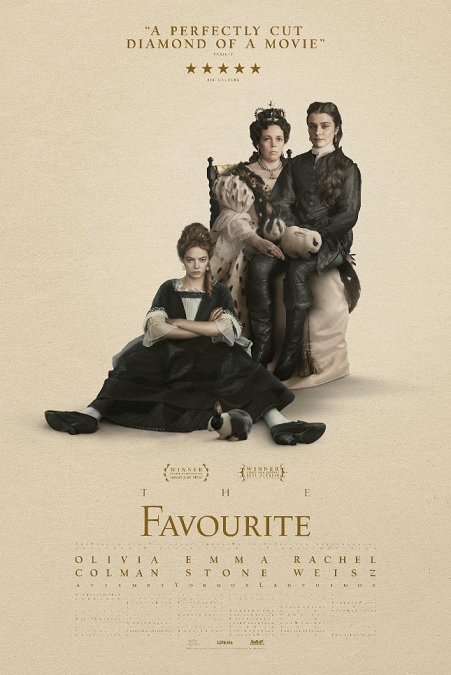



The Favourite – 2018
This was a really strange movie, and I can say that for several specific reasons. I’m not sure if I actually enjoyed it or not. I liked the basic plot, which was easy enough to follow and entertaining, however, many of the directorial choices were so unusual that they didn’t seem to fit with the period piece nature of the film. I think the director, Yorgos Lanthimos, was trying too hard to be artsy, and while he certainly wowed the critics, he may have lost the common audiences. I’ll explain.
Here is a really quick, bare-bones synopsis of the plot. The narrative focuses on three women, Sarah Churchill, Duchess of Marborough, played by Rachel Weisz, her cousin Abigail Hill, played by Emma Stone, and Queen Anne of Great Britain, played by Olivia Colman. The Queen is often ill, so Sarah, her closest friend, confidant, advisor, and lover, often runs the affairs of state, or at least, she tells the Queen what to think and do. Abigail was once a lady who has fallen on hard times. She gains employment as a scullery maid in the Queen’s kitchens. In a struggle to once again become a proper lady, Abigail befriends Sarah and the Queen. She manipulates her way into the Queen’s favor, and then her bed. Seeing her position as Anne’s favourite threatened, Sarah tries to get rid of Abigail. The two women plot and scheme against each other until the Queen chooses one of them to remain in her close service. The end.
It was the vicious plotting and backstabbing that made the narrative interesting. It is what made it good. But I didn’t really care for some of the details. For example, the movie went out of its way to display, and maybe glorify, some of the disgusting vulgarities of the rich and powerful aristocracy of the early 1700s. There was a scene in which Anne was alone and gorging herself on some food. Every so often she would need to casually vomit into an urn held by a waiting servant. When someone would try to wipe her clean, she would wave them away and continue playing solitaire, green offal caking her chin. There was another scene in which a group of young male courtiers were taking sport throwing rotten fruit at a naked man in front of a dressing screen. The target seemed to be having just as much fun as the others throwing the fruit. And nobody seemed concerned in the least to be seen wallowing in these activities.
And then there was the lesbian content of the plot. Personally, I have no problem with it, but did the Queen really casually comment on how much she enjoyed receiving oral sex from a maid in front of the livery and anyone else who might overhear? Of course, she was the Queen, so who would scold her for impropriety? But I have to wonder if that was how those people really behaved. Apparently, it wasn’t, and Lanthimos knew it. He knew he was ignoring historical accuracy, and didn’t care. But he was also unapologetic about it, which I can respect. He was inventing things for dramatic effect, for shock value, and to explore his own creative whims. Ok, if that’s the film you want to make, but I think it could have been just as good a story if reality was respected just a bit more.
But more than that, there were directorial choices that I didn’t feel connected with the period. I understand that Lanthimos was consciously doing these things to create effects, moods, and even subliminal perceptions, but a lot of it really took me out of the story, which I feel was strong enough to stand on its own. For example, there were several shots, not scenes mind you, but shots in which he encouraged the camera man to use a fisheye lens, though this technique seemed to be randomly used. For me, it was just disorienting and unnecessary. There was also prolific use of wide angle shots which made the characters on the screen seem isolated and small compared to the large and opulent sets. And for a lot of the movie, the camera was positioned on the floor, looking up at the actors, making them seem high and haughty, and subsequently making me feel like a bug beneath their feet. Again, I see what Lanthimos was trying to do, but it also had the unfortunate effect of detaching me from the story, though just a bit.
The minimalist, soundscape noise used to underscore many of the movie’s more dramatic moments didn’t help at all. It was disorienting and distracting from the drama taking place, and isn’t a film’s underscoring supposed to support the action? And I also didn’t really care for the monochromatic color palate for nearly every costume in the movie. The costumes were all individually beautiful, but ultimately boring because of their complete lack of color throughout the entire film.
But then there were the powerful performances. There is no denying that all three women, Weisz, Stone, and Colman each turned in some fantastic dramatic performances, especially Colman. In fact Olivia Colman took home the Oscar for Best Supporting Actress for the role. And I really liked a lot of the dramatic tension between Weisz and Stone. Oh yeah, and there were a few men in the film like Nicholas Hoult as 1st Earl of Oxford, Robert Harley, Joe Alwyn as 1st Baron Samuel Masham, the man Abigail marries to secure a higher station, and Mark Gatiss as John Churchill, Sarah’s husband. But their characters were nearly as incidental as their subplots about England suing for peace with defeated French forces.








